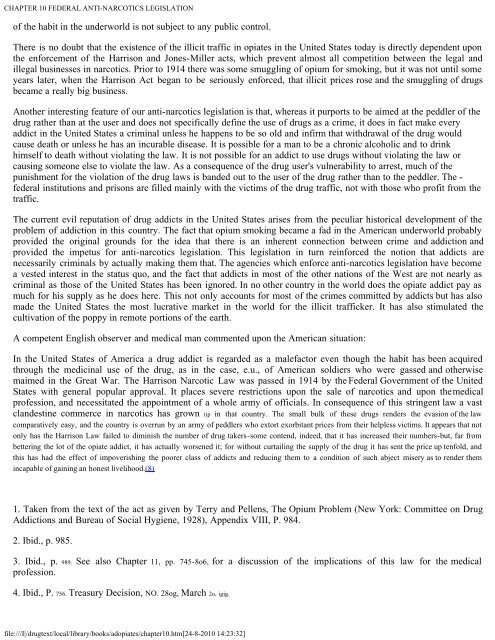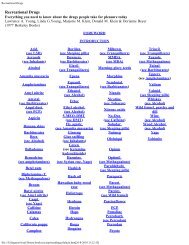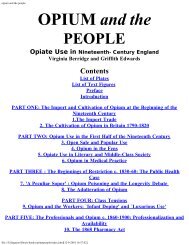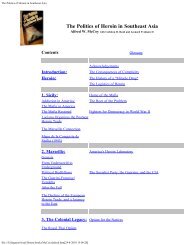Addiction and Opiates
Addiction and Opiates
Addiction and Opiates
Create successful ePaper yourself
Turn your PDF publications into a flip-book with our unique Google optimized e-Paper software.
CHAPTER 10 FEDERAL ANTI-NARCOTICS LEGISLATION<br />
of the habit in the underworld is not subject to any public control.<br />
There is no doubt that the existence of the illicit traffic in opiates in the United States today is directly dependent upon<br />
the enforcement of the Harrison <strong>and</strong> Jones-Miller acts, which prevent almost all competition between the legal <strong>and</strong><br />
illegal businesses in narcotics. Prior to 1914 there was some smuggling of opium for smoking, but it was not until some<br />
years later, when the Harrison Act began to be seriously enforced, that illicit prices rose <strong>and</strong> the smuggling of drugs<br />
became a really big business.<br />
Another interesting feature of our anti-narcotics legislation is that, whereas it purports to be aimed at the peddler of the<br />
drug rather than at the user <strong>and</strong> does not specifically define the use of drugs as a crime, it does in fact make every<br />
addict in the United States a criminal unless he happens to be so old <strong>and</strong> infirm that withdrawal of the drug would<br />
cause death or unless he has an incurable disease. It is possible for a man to be a chronic alcoholic <strong>and</strong> to drink<br />
himself to death without violating the law. It is not possible for an addict to use drugs without violating the law or<br />
causing someone else to violate the law. As a consequence of the drug user's vulnerability to arrest, much of the<br />
punishment for the violation of the drug laws is b<strong>and</strong>ed out to the user of the drug rather than to the peddler. The -<br />
federal institutions <strong>and</strong> prisons are filled mainly with the victims of the drug traffic, not with those who profit from the<br />
traffic.<br />
The current evil reputation of drug addicts in the United States arises from the peculiar historical development of the<br />
problem of addiction in this country. The fact that opium smoking became a fad in the American underworld probably<br />
provided the original grounds for the idea that there is an inherent connection between crime <strong>and</strong> addiction <strong>and</strong><br />
provided the impetus for anti-narcotics legislation. This legislation in turn reinforced the notion that addicts are<br />
necessarily criminals by actually making them that. The agencies which enforce anti-narcotics legislation have become<br />
a vested interest in the status quo, <strong>and</strong> the fact that addicts in most of the other nations of the West are not nearly as<br />
criminal as those of the United States has been ignored. In no other country in the world does the opiate addict pay as<br />
much for his supply as he does here. This not only accounts for most of the crimes committed by addicts but has also<br />
made the United States the most lucrative market in the world for the illicit trafficker. It has also stimulated the<br />
cultivation of the poppy in remote portions of the earth.<br />
A competent English observer <strong>and</strong> medical man commented upon the American situation:<br />
In the United States of America a drug addict is regarded as a malefactor even though the habit has been acquired<br />
through the medicinal use of the drug, as in the case, e.u., of American soldiers who were gassed <strong>and</strong> otherwise<br />
maimed in the Great War. The Harrison Narcotic Law was passed in 1914 by the Federal Government of the United<br />
States with general popular approval. It places severe restrictions upon the sale of narcotics <strong>and</strong> upon the medical<br />
profession, <strong>and</strong> necessitated the appointment of a whole army of officials. In consequence of this stringent law a vast<br />
cl<strong>and</strong>estine commerce in narcotics has grown tip in that country. The small bulk of these drugs renders the evasion of the law<br />
comparatively easy, <strong>and</strong> the country is overrun by an army of peddlers who extort exorbitant prices from their helpless victims. It appears that not<br />
only has the Harrison Law failed to diminish the number of drug takers-some contend, indeed, that it has increased their numbers-but, far from<br />
bettering the lot of the opiate addict, it has actually worsened it; for without curtailing the supply of the drug it has sent the price up tenfold, <strong>and</strong><br />
this has had the effect of impoverishing the poorer class of addicts <strong>and</strong> reducing them to a condition of such abject misery as to render them<br />
incapable of gaining an honest livelihood.(8)<br />
1. Taken from the text of the act as given by Terry <strong>and</strong> Pellens, The Opium Problem (New York: Committee on Drug<br />
<strong>Addiction</strong>s <strong>and</strong> Bureau of Social Hygiene, 1928), Appendix VIII, P. 984.<br />
2. Ibid., p. 985.<br />
3. Ibid., p. 989. See also Chapter 11, pp. 745-8o6, for a discussion of the implications of this law for the medical<br />
profession.<br />
4. Ibid., P. 756. Treasury Decision, NO. 28og, March 2o, igig.<br />
file:///I|/drugtext/local/library/books/adopiates/chapter10.htm[24-8-2010 14:23:32]





